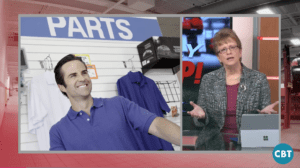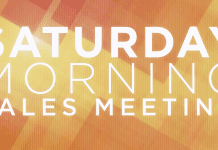On this week’s episode of the Weekly Tune-Up, Becky Nixon talks about a topic discussed during expense conversations in your parts and service operation: the cost of a parts wholesale business.
Video Transcription:
Hello, and welcome to the CBT News Weekly Tune-Up program. I am Becky Nixon, the host of the show. I am also the Director of Fixed Ops Training for David Lewis and Associates.
Today I am going to talk about a topic spoken during expense conversations in our parts and service operations. It doesn’t matter if fuel prices, vehicle insurance or personnel costs are on the rise or falling, the cost of a parts wholesale business always comes up around the end of year expense and forecast meetings.
This additional profit leg of a dealership parts operation is often seen as either a looming expense or an additional gross profit opportunity by all in the room during the annual forecast meetings. Yet often overlooked in the debate is the dealerships own service department.
There are three important tie in’s I must mention at this point:
First is the fact that a healthy parts wholesale mechanical business helps to broaden the dealerships parts inventory. The constant complaints of the parts department never having that O2 sensor, water pump or even wheel stud are minimized when the departments inventory has a broader pool of demand.
Let’s face it, the Customers driving our cars are going to the small and chain store independent shops, and these shops use at times up to 50% OE parts when repairing those vehicles. Those same parts they are requesting will at some point be needed by your service department technicians. The more demand there is on any particular part, the more likely it is that the parts department is going to stock that particular O2 Sensor.
Secondly, there are in business definite benefits to the quid pro quo analogy. Developing solid business relationships with local independent shops in your area can boost your service department revenue. Yes, they are your competition, but they are also a part of your customer base. Having a give and take relationship with your competitors makes them much more valuable than standing across the street from each other hurling insults and stones.
As today’s vehicles become more complicated and technology driven, research shows that there are less vehicle repair concerns the independents are willing to take on, therefore they are left to recommend a dealer. If your dealership already has a solid business relationship with these shops through your parts department, you benefit from the recommendation.
The third point is slightly on the negative curve: You must be careful if your parts department does have a successful wholesale operation, it doesn’t interfere with the service departments ability to take care of your service customers.
Yes, local independent service shops and franchises can and should be a part of your customer base. But you must always see your priority customers as those who come thorough your service department to buy your products and have you service their vehicles. Your techs must never be having to delay working on your customers vehicles because your parts department sold a part they needed to the independent down the street.
To paint the picture better, your service advisor has a retail Customer in the lounge. His 2013 SUV has a check engine light concern and the Customer has already approved the repair. The Customer insists on waiting, so your parts counter person needs to pick up the gasket at the dealer across town. However, all the delivery drivers are out delivering wholesale parts.
To appease the Customer, service bears the expense and must convince the Customer to take a rental car. This rental expense turns into two days because the parts delivery driver does not make it back with the acquired part until the end of the business day. Sound familiar?
. . . . . I will be back in a moment to expand on this situation so stay with me. But first, a short break to share some exciting information that can help take your Fixed Operations success to the next level.
Well I’m back again, so let’s look at some of the obvious expenses of operating a successful parts wholesale business today. The staples are personnel, delivery vehicles, marketing and often a larger inventory. But in this new millennium, you are no longer dealing with a majority of baby boomer customers. Your parts wholesale customers are most likely Gen X or Millennials.
With this being the case, marketing, acquiring and keeping these customers brings a different type of challenge if your Parts Manager is a baby boomer like me. A young baby boomer, but a boomer no less!
So, additionally there is technology, web available ordering, delivery options, NAV and tracking systems, CRM and Communication with texting ability. And remember, those you are delivering too typically do not prefer to talk on the phone. They were raised on technology and using it is their preferred form of communication.
And as we all know, Technology is not FREE! Nor is it cheap.
So, for every dealership parts operation the answer to this question is going to ultimately depend on that operations staffing, inventory floorplan, overhead and market opportunity. As the Millennials and Gen X’ers take over the running of these positions and shops traditionally handled by baby boomers, prepping yourself for communicating successfully and maintaining good relationship will be key for developing additional profit streams without choking your own in-house workflow in the process.
. . . . . Well that is it for today’s program. Email me at bnixon@davidlewis.com if you would like me to send you a “Parts Department Wholesale Profit Spread Sheet”. I will be glad to do that and help you find some answers to any challenges you face in this area.
And don’t forget to check out our DLA Training Curriculum. Our entire roster and schedule of training courses can be found at www.davildlewis.com.
Thanks for joining me today for this show and I hope you come back next week for our next exciting look at how to increase your success and profits in your Fixed Operations.
Until then, this is Becky Nixon saying have a great week.




